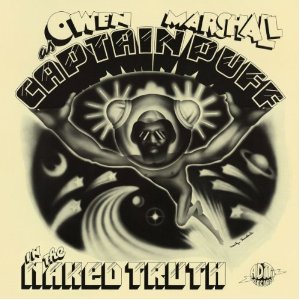“A great deal of creative energy has gone into the making of this LP. Which somehow illustrates what a very wise one once said, ‘If you want anything done right, do it yourself’,” stated the late Owen Marshall on the release of this private press LP from 1975. While labels like Impulse and Blue Note were responsible for releasing seriously deep spiritual jazz throughout the 60s and 70s, a whole swathe of independents from Strata East in New York to Tribe in Detroit, were home to even more radical music.
But beneath that radar, deep in the underground, other more independent spirits went it alone with their own private press LPs. Free of the commercial pressures of the majors or any creative alignment to a collective, the results were often wildly free and experimental releases that resonated with a direct honesty. Records like The Naked Truth now reissued by Jazzman whose Holy Grail series has already been responsible for uncovering some incredible private press releases, alongside a selection of essential spiritual jazz LPs.
Known to fetch $1,000 amongst collectors this is perhaps not only one of the rarest but also the most unique of all the Jazzman releases. “Every once in a while, a record presents itself so defiant in its refusal of categorisation that it becomes the bane of those poor vinyl archaeologists whose business it is to file and classify,” states Suzi Arnold in the liner notes of this eagerly awaited reissue.
On the back of the original sleeve are three photos of Owen Marshall at the piano, playing flute and on keys, naked of course, perhaps a statement on the child like purity of this session recorded at Compton Community College, Los Angeles. Marshall had composed and arranged Lee Morgan’s first two LPs on Blue Note and his compositions would be recorded by such jazz luminaries as Jackie McLean and Horace Silver, but it’s fair to say by the time of this self produced LP, he had distanced himself from the jazz establishment. “Most of the so called producers I’ve met could do no more for me that I could do for myself,” he stated in the original liner notes. And it’s this belief in his own sound that runs deep through this “wayfaring stray of an album that weaves its insouciant magic through the edgelands of sound.”
The LP came to fruition after a 1974 performance at UCLA and it’s the same group of heavyweight musicians who form the backbone of this free and far out ensemble. The album opens with Marshall on his own though with the aptly entitled ‘Electric Flower’ with Owen’s soaring alto and some freaky Obe synth lines and otherworldly narration creating a warm but slightly unsettling introduction. The beautiful lament that is ‘Nana’s Sleeping’ negates any thoughts that this offering is going to be a hard listen throughout though. By the time the wonderfully entitled modality of ‘Peanut Butter Ice Cream Man’ breezes through the speakers (with touches of Yusef Lateef and Lonnie Liston Smith) the naked truth is that this is indeed an LP that is “playful, free, imbued with a sense of wonder and pure joy usually ascribed to that most natural genius of the imagination – the child.”
Like another jazz outsider and musical prophet Moondog, Marshall’s use of home made instruments like the hosaphone, boonet, and “some for which I have no name” further expanded this multi-instrumentalists vision. “By creating these instruments and then learning to play them, I discovered a new dimension in sound,” explained Marshall in the original sleevenotes, and tracks like ‘Paper Man’ where these instruments are used to full effect are imbued with a freedom and exotica that makes this a truly exploratory yet cohesive session. But at the end of the day it’s all about music touching the soul and the towering ‘Grunt Uh-Uh-Uh’, one of two bonus tracks here, is a powerful piece of astral jazz that makes Owen Marshall a worthy contemporary of titans like Pharaoh Sanders.
Touched by the psychedelic winds that blew through the west coast a few years before and the militant pulse that had weakened in many jazz quarters by the mid ‘70s, The Naked Truth remains a fierce, free but ultimately beautiful expression of creative freedom.


